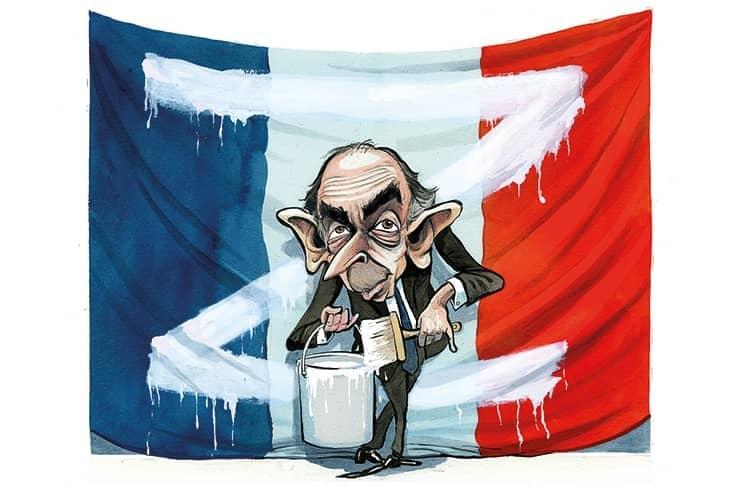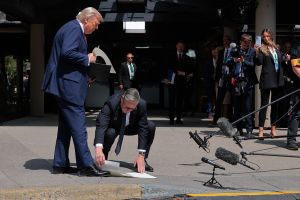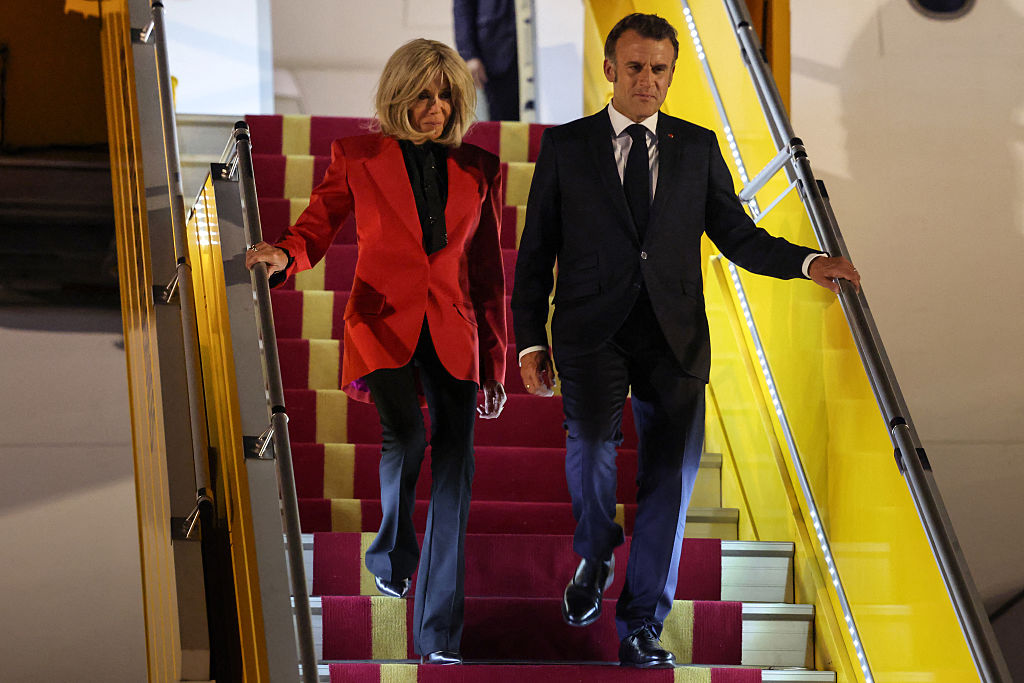The fact that Éric Zemmour hasn’t yet declared himself a candidate in next year’s French presidential election is a bit of a joke. A Harris poll last week put him on 17 percent, ahead of all other rivals to President Emmanuel Macron. And he’s holding rallies across France at which adoring fans in “Zemmour 2022” T-shirts chant: “Zemmour! Président!”
He’s still pretending to be a TV personality on a big book promotion tour. But Mr Z is running and everybody knows it. He has a devoted and surprisingly professional campaign behind him, the nucleus of a political party, conceived with a clear mission: to restore la gloire de la France. His new book has the faintly ridiculous title La France n’a pas dit son dernier mot (France has not said its final word) and has already sold more than 150,000 copies. He’s insanely popular.
The Parisian establishment, and most foreign correspondents in France, are eager to dismiss him as a rabble-rouser and a show-off. He’s called “far-right” and fascist. Stanford University’s Cécile Alduy, whom the Guardian calls “an expert on French political semantics,” says that “Zemmour uses a very old-fashioned, French far-right discourse… But what is new is the reception and acceptance of this discourse in the public conversation.” What drives the media really crazy is its inability to stop talking about Zemmour.
Bernard-Henri Lévy, another flamboyant public intello, has accused him of being a Jewish anti-Semite. The truth is Zemmour, the son of Algerian immigrants, says lots of things Lévy has said about Islam over the years, just more forcefully. He also says what a lot of French people know to be right: France has failed to assimilate large parts of its Muslim population and that is a problem.
Zemmour has often been compared to Trump and he does want to Make France Great Again. “We want to protect our language,” he says, “the most beautiful in the world, the most clear, we want to protect it from American and North African influence and inclusive writing.’”
A better comparison, though, might be with Boris Johnson. Like the British Prime Minister, Zemmour has a first-rate mind and is often mistaken for a clown. He is a patriotic thinker who writes his own books and has a back catalogue of offensive remarks and articles for critics to pore over. He’s also someone who seems to fail upwards.
Zemmour (the name derives from the Berber word for olive tree) is less of a classical liberal than Johnson. He calls himself a Gaullist, doesn’t like what he calls “the gay lobby” and has spoken darkly of a coming war between races. He believes that unless immigration is checked France will become “an Islamic Republic.” He’s even been convicted for inciting racial hated after he said on television that most drug dealers were “blacks and Arabs.”
To his fans, however, Zemmour’s more provocative rhetoric is evidence of sincerity. Zemmour will at some stage soon announce a new political party (let’s hope for an amusing name). A 200-page manifesto is nearly finalized, and his advisers are quick to tell you that it dwells on much more than immigration. He wants to lower taxes, especially on inheritance and small businesses. While sensitive to the essential statism of the French system, he has ambitious plans to reduce France’s monstrous deficit by tackling widespread welfare fraud. As president, he would keep France in Nato, but remove his country from the organization’s integrated command. That may seem a small gesture, involving only a few hundred French troops, but Zemmour intends to signal that under his leadership, France’s role in the world will not be decided in Washington, Brussels or Berlin. He also intends to reset France’s relationship with Russia and move away from the reflexive anti-Putinism of America and Britain.
Zemmour is no “Frexiteer.” “We need to have economic credibility,” says one of his advisers. “So that excludes adventures such as leaving the euro or the [European] Union.” Yet his team does talk about “taking back control” from Europe and he is proposing another referendum in order to put French law above that of the EU.
What Zemmour threatens to do — and what makes him so terrifying to the existing political class — is unite the right in an essentially conservative country. For decades, French socialists have kept themselves in power by dividing their opposition, splitting off the centrist and socially acceptable Union Pour Un Mouvement Populaire (renamed Les Républicains in 2015) from the proletarian and quasi-fascist Front National (renamed Rassemblement National in 2018). Marine Le Pen, who took over her father’s genuinely extreme movement, has spent years trying to detoxify the family brand. She embraced gays and ditched the Holocaust denialism, which was sweet of her. Her efforts culminated in 2017, when she reached the last round of the presidential election. Still, she lost handsomely to Macron and now her support base is collapsing.
Zemmour is better positioned to sweep up the center ground. With his culture war wizardry and his Trump/Johnson-like ability to render the media apoplectic, he can always annoy the snobs enough to keep the plebs happy. But he can also woo middle- and upper-middle-class French people, Catholics as well as small business owners and secular liberals.
Zemmour appeals to an older French conservatism, a nostalgia for France before the incestuous Soixante-Huitards came along and wrecked everything. He speaks often of Great French Men, among whom probably he counts himself. He likes to quote the opening of Jacques Bainville’s History of France: “France is neither an empire nor a race. It is better. It is a nation.” His campaign believes his rousing appeals for French rejuvenation, mixed with his anger towards an out-of-control immigration system, will mobilize low-propensity voters.
At the same time, the Zemmour 2022 playbook may resemble nothing so much as Macron 2017. By founding En Marche, President Macron was able to turn on turned-off voters and repackage his Eurocentric center-leftism as something radical and new. In doing so, he murdered the old-fashioned French left, just as Tony Blair destroyed old Labour in the 1990s. The Parti Socialiste is now dying: its candidate Anne Hidalgo is polling at 5 percent. Meanwhile, the crepuscular radical Jean-Luc Mélenchon, the French Bernie Sanders, is on 11 percent.
Zemmour is also an existential menace to Les Républicains, who can’t seem to settle on their best candidate for next year. Michel Barnier is the establishment choice, but he’s not much more loved in France than he is in Britain after the Brexit negotiations. Xavier Bertrand is more of a party bruiser type, and he’s polling at 14 percent. Valérie Pécresse is admired in political circles but has so far failed to make much of an impression as a presidential contender. The problem for all these figures is that Zemmour sucks up all the airtime they might normally absorb. The rise of Z — a moniker he mischievously cultivates — is just a much better story.
Zemmour is shrewd. He spies an opportunity to offer a new “third way” for the right. He can mix populist rhetoric about immigration and Macron’s ghastly vaccine passports with detailed plans for healthcare reform and a new corporate tax system.
He remains a wild insurgent and a very long shot for the presidency. He may just end up being another vote-splitter on the right. His campaign could have problems financing itself. Even if he manages to gazump Le Pen, eviscerate Les Républicains and finish in the top two in the first round of the election on April 10, he will struggle to overcome Macron, who despite his unpopularity still has the advantages of the incumbency. But the prospect of those two dynamic, combative and eloquent politicians squaring off in televised debates is an exciting one. In the big discussion about what it means, fondamentalement, to be French, Mr Z may have the final word.
This article was originally published in The Spectator’s UK magazine. Subscribe to the World edition here.

























